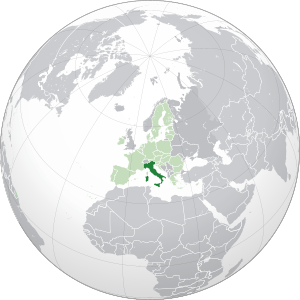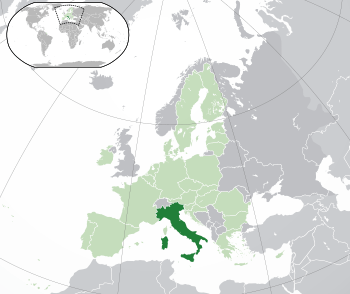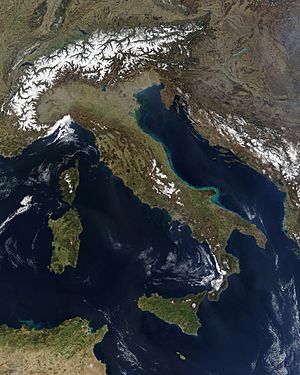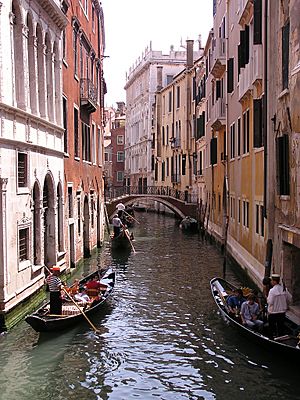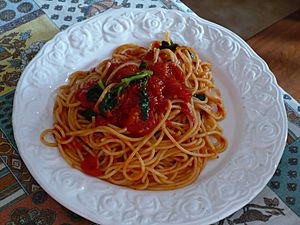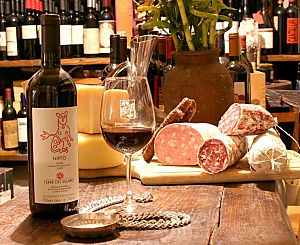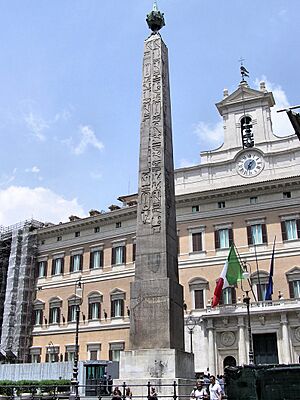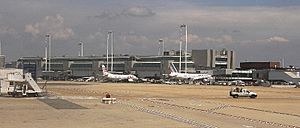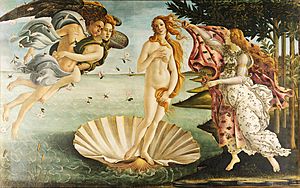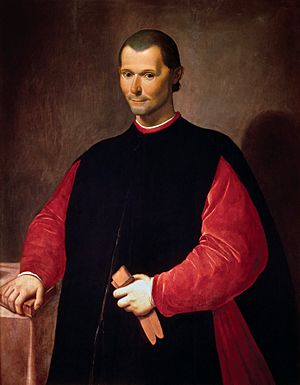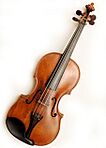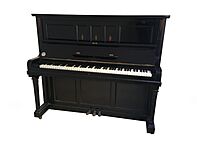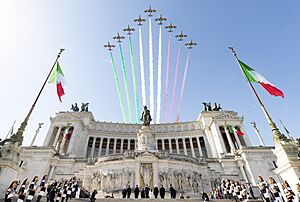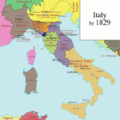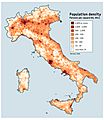Italy facts for kids
Quick facts for kids
Italian Republic
Repubblica Italiana (Italian)
|
|
|---|---|
|
Anthem: "Il Canto degli Italiani"
"The Song of the Italians" |
|
|
Location of Italy (dark green)
– on the European continent (light green & dark grey) |
|
| Capital and largest city
|
Rome 41°54′N 12°29′E / 41.900°N 12.483°E |
| Official languages | Italiana |
| Nationality (2021) |
|
| Native languages | See main article |
| Religion
(2020)
|
|
| Demonym(s) | Italian |
| Government | Unitary parliamentary republic |
|
• President
|
Sergio Mattarella |
| Giorgia Meloni | |
| Ignazio La Russa | |
| Legislature | Parliament |
| Senate of the Republic | |
| Chamber of Deputies | |
| Formation | |
|
• Unification
|
17 March 1861 |
|
• Republic
|
12 June 1946 |
|
• Current constitution
|
1 January 1948 |
| Area | |
|
• Total
|
301,340 km2 (116,350 sq mi) (71st) |
|
• Water (%)
|
1.24 (2015) |
| Population | |
|
• 2024 estimate
|
|
|
• Density
|
195.7/km2 (506.9/sq mi) (71st) |
| GDP (PPP) | 2024 estimate |
|
• Total
|
|
|
• Per capita
|
|
| GDP (nominal) | 2024 estimate |
|
• Total
|
|
|
• Per capita
|
|
| Gini (2020) | ▼ 32.5 medium |
| HDI (2022) | very high · 30th |
| Currency | Euro (€)b (EUR) |
| Time zone | UTC+1 (CET) |
|
• Summer (DST)
|
UTC+2 (CEST) |
| Calling code | +39c |
| ISO 3166 code | IT |
| Internet TLD | .it |
|
|
Italy, officially the Italian Republic, is a country in Southern Europe. It sits on a peninsula that reaches into the middle of the Mediterranean Sea. The Alps mountains form its northern border. Italy also includes several islands, like Sicily and Sardinia.
Italy shares borders with France, Switzerland, Austria, Slovenia, and two tiny countries: Vatican City and San Marino. It also has a small area called Campione surrounded by Switzerland. Italy is the tenth-largest country in Europe by land area. It covers about 301,340 square kilometers (116,347 sq mi). It is the third most populated country in the European Union, with almost 60 million people. Its capital and largest city is Rome.
Long ago, the Italian peninsula was home to many different groups of people. The city of Rome, founded by the Latin people, grew into a powerful Empire. This empire ruled much of the Mediterranean world for centuries. As Christianity spread, Rome became the main center for the Catholic Church and the Pope.
After the Western Roman Empire fell, Italy saw many changes. By the 11th century, Italian city-states and trading republics grew strong. This brought new wealth through trade and helped create modern capitalism. The Italian Renaissance was a time of great art and learning. It started in Florence in the 15th century and spread across Europe. Italian explorers also found new routes to distant lands, starting the European Age of Discovery.
For centuries, Italy was divided into many small states. This was due to rivalries and conflicts. In 1861, Italy was mostly unified, forming the Kingdom of Italy. This happened after wars and a famous event called the Expedition of the Thousand. From the late 1800s to the early 1900s, Italy became more industrial, especially in the north. It also gained some colonies. However, the south remained poor, leading many Italians to move to other countries.
Italy fought in World War I from 1915 to 1918. After the war, a period of trouble led to the Fascist dictatorship in 1922. During World War II, Italy was first part of the Axis powers. But it later surrendered to the Allies. After the war, the country became a republic in 1946. Italy then experienced a strong recovery, known as the "economic miracle".
Today, Italy has the eighth-largest economy in the world. It has the second-largest manufacturing industry in Europe. Italy plays an important role in global affairs. It is a founding member of the European Union and part of many international groups like NATO and the G7. Italy is famous for its art, music, literature, food, fashion, and science. It has the most World Heritage Sites in the world (59). It is also the fifth-most visited country.
Contents
History of Italy

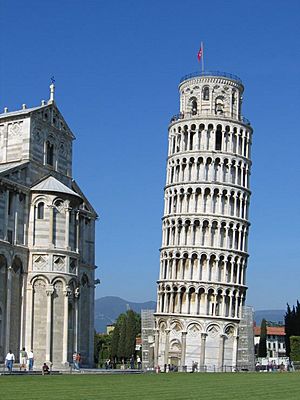
People have lived in Italy for a very long time. Proof of this dates back about 200,000 years ago, to the Old Stone Age.
Italy has greatly influenced the culture of the whole Mediterranean area. It has also deeply shaped European culture. Many important civilizations have existed there since prehistoric times. After the Magna Graecia (ancient Greek settlements) and the Etruscan civilization, the Roman Republic and Empire ruled this part of the world for many centuries. Later, Italy was central to European science and art during the Renaissance.
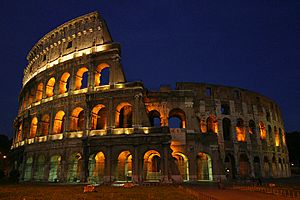
Ancient Rome and Medieval Times
Italy was the heart of the Roman civilization for hundreds of years. After the Roman Empire fell, Italy lost its unity. Different tribes invaded, like the Ostrogoths and Lombards. This left the peninsula divided. For centuries, the country was affected by different groups. Many people left cities to find safety in the countryside. They sought protection from powerful feudal lords.
After the Lombards, the Franks took over in 774. Italy became part of the Holy Roman Empire. The Church also started to gain power. This made it harder for Italy to become one united country.
Around the year 1000, the population and economy slowly started to grow again. Cities became important once more. They organized themselves into Comuni, which were like small self-governing states. Trade, arts, and literature also grew. Later in the Middle Ages, these Comuni were replaced by absolute rulers called Signorie. But Italy remained divided, especially in the north and center. The southern part, including Naples, Apulia, and Sicily, stayed under one ruler. Venice and Genoa built strong trading empires in the Mediterranean and Black Sea.
Italy during the Renaissance
The Black Death in 1348 was a terrible event for Italy. It killed one-third of the population. But the recovery from this disaster led to a new growth in cities, trade, and the economy. This helped start the Humanism and Renaissance periods (15th-16th centuries). During this time, Italy again became a center of Western civilization. It strongly influenced other European countries. The many Signorie joined together into a few regional states. But none of them were strong enough to unite the whole peninsula.
For about a century, the Italian states managed to stay somewhat independent. But in 1494, the French king Charles VIII began a series of invasions. This led to a long fight between France and Spain for control of Italy. Spain eventually won in 1559. It gained control of areas like Duchy of Milan and the Kingdom of Naples. For almost 200 years, Spain was the main power in Italy.
Spain and the Catholic Church worked together. They stopped any Protestant movements. This meant Italy remained a Catholic country. The Spanish rule and Church control led to less new ideas and economic decline. This also happened because main trade routes shifted from the Mediterranean to the Atlantic Ocean.
Napoleonic Era and Unification Efforts
Austria took over from Spain as the main power in Italy after 1713. This was a big improvement. The northern part of Italy, under Austrian control, became economically strong again. New ideas and energy returned.
The French Revolution and the Napoleonic Wars (1796-1815) brought new ideas to Italy. These included equality, democracy, law, and the idea of a nation. Italy was not a main battlefield, but Napoleon changed its political map completely. In 1799, he destroyed the Republic of Venice, which never became independent again. The states Napoleon created were short-lived. They did not last after his defeat in 1815.
After Napoleon, most of the old states were restored. The Republic of Venice went to Austria, and the Republic of Genoa went to Savoy. However, Napoleon had inspired the first national movement for unity and independence in Italy. Small groups of Italian patriots and liberals started uprisings in the decades leading up to 1860. Giuseppe Mazzini and Giuseppe Garibaldi were important leaders. They wanted reforms for the poor. From 1848, the Italian patriots were supported by Vittorio Emanuele II, the king of Sardinia. He dedicated his royal family, the House of Savoy, to Italian unity.
Unifying Italy
Italy was unified on March 17, 1861. This happened after a successful war against Austria, with help from France. Also, Giuseppe Garibaldi led an invasion of the Kingdom of the Two Sicilies (Naples and Sicily) in 1860. Vittorio Emanuele II became the first king of united Italy.
The country grew to include Veneto and Venice in 1866. This was after another war, fought by Italy and Prussia against Austria. Rome and Lazio became part of the Kingdom of Italy on September 20, 1870. This happened after Italian troops entered the city. Before that, Rome was protected by France and remained under the Papacy.
The first united Italian state faced many challenges. There was a rebellion in the South against the new rule. The economy was slow, and many people were poor and uneducated. Most people spoke local dialects, not Italian.
In 1878, Umberto I became King after his father. He was killed in 1900 and his son, Vittorio Emanuele III, became king.
Modern Italy: Wars and a Republic
Industrialization and modernization began in northern Italy in the late 1800s. But the south remained poor and overcrowded. Millions of Italians moved abroad to find work and better lives. This continued until the 1970s. Over 26 million Italians moved to countries like France, Germany, the United States, and Brazil.
Democracy started to grow in the early 1900s. Basic freedoms were granted in 1848. But only men who owned property or were educated could vote. In 1913, all men were allowed to vote. The Socialist Party became the main political party.
The path to democracy was interrupted by World War I (1915-1918). Italy fought alongside France and Great Britain. Italy defeated the Austrian-Hungarian Empire in November 1918. It gained new territories like Trentino, South Tyrol, and Trieste. But the war cost Italy many lives and caused economic problems. This led to instability, which helped the Fascist movement take power in 1922. King Vittorio Emanuele III supported them, fearing a civil war.

The Fascist dictatorship of Benito Mussolini lasted from 1922 to 1943. In 1929, Mussolini made a deal with the Holy See. This created the independent state of Vatican City for the Catholic Church in Rome. In 1935, Italy invaded and took over Ethiopia. This made Italy less friendly with France and Great Britain. Italy then became closer to Nazi Germany. They signed agreements in 1936 and 1938. Italy supported Franco in the Spanish Civil War and Hitler's plans in Europe.
In April 1939, Italy occupied Albania. In September 1939, when Germany invaded Poland, Mussolini wisely decided not to join the war. This was because Italy's army was not ready. Italy entered World War II in June 1940, when France was almost defeated. Mussolini hoped for a quick victory. But Italy's army was weak. Italy invaded Greece in October 1940 but had to retreat. Italy also lost its colonies in Africa.
On July 25, 1943, Mussolini was removed from power. On September 8, 1943, Italy announced it was no longer allied with Germany. Italy then fought with the Allies. In Northern Italy, a resistance movement fought against the German invaders.
Mussolini tried to create a small Fascist state in Northern Italy, called the Republic of Salò. But it failed. On April 25, 1945, Italy became free. On June 2, 1946, Italy became a republic. For the first time, women were able to vote. Italians chose a republic instead of a monarchy.
In February 1947, Italy signed a peace treaty. It lost all its colonies and some land. Since then, Italy has joined NATO and the European Community (now the European Union). It has become one of the world's biggest industrial economies.
Geography of Italy
Italy is a peninsula, meaning it is surrounded by the sea on three sides. Its northern side is connected to mainland Europe. The Alps mountains separate Northern Italy from France, Switzerland, and Austria. Mont Blanc, the highest mountain in Western Europe, is part of this chain. The second important mountain range in Italy is the Apennines. These mountains run through central and southern Italy.
The capital of Italy is Rome, where the Roman Empire began. Other major cities include Milan, Turin, Florence, Genoa, Naples, Palermo, and Venice. Italy has several islands, with Sicily and Sardinia being the largest. You can reach them by ship or plane. Italy also shares maritime borders with Libya to the south.
The Po River is the longest river in Italy. It flows through cities like Turin, Piacenza, and Ferrara. The Tiber River runs through the city of Rome.
Northern Italy has some of the country's largest lakes. These include Lake Garda, Lake Como, Lake Maggiore, and Lake Iseo. Because it is surrounded by the sea, Italy has many kilometers of coast. This brings many tourists from all over the world. Tourists also visit Italy to see its many historical places.
Two very small, separate countries are located within Italy. They are San Marino, which is surrounded by part of Northern Italy, and the Vatican City, which is inside Rome.
People and Culture
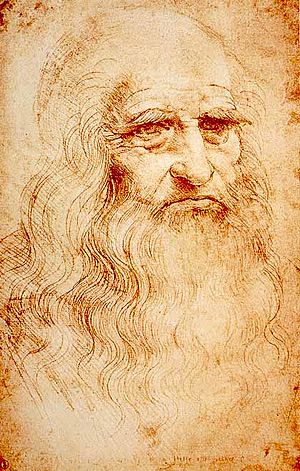
People from Italy are called Italians. Even if an Italian moves away, their children might still be able to become Italian citizens. This is because Italian law often relies on "right of blood." Most Italians are Christians, and most of these are Roman Catholics. The head of the Catholic Church, the Pope, lives in Vatican City.
Italy's population is a little over 60 million. About 2.7 million people live in Rome, and 1.3 million in Milan. In 2015, over 5 million foreigners lived in Italy, making up 8.3% of the total population.
The official language of Italy is Italian. In some small areas, people also speak German, Slovenian, or French. Many different dialects of Italian are spoken, like Sicilian and Sardinian. These dialects can vary a lot between regions and even between smaller areas.
Most Italian people are descendants of the ancient Romans.
Italy has more World Heritage Sites than any other country. These sites are important culturally and are recognized by UNESCO. About 60% of the world's art works are in Italy. Italy is also a big wine producer. In 2005, it made over 5 million tonnes of wine.
Economy of Italy
Italy has a modern system to help its citizens. The job market is quite strong. Many foreigners, especially from Romania, work in Italy because wages are higher there. However, Italy has a high national debt. The government is working to manage this debt.
Religion in Italy
| Italy religiosity | ||||
|---|---|---|---|---|
| Religion | percent | |||
| Christianity | 90% | |||
| No religion | 7% | |||
| Islam | 2% | |||
| Others | 1% | |||
Most people in Italy are Roman Catholics. However, the Catholic Church is no longer the official state religion. About 87.8% of people identify as Roman Catholic. About a third of them are active members.
There are also other Christian groups in Italy. More than 700,000 are Eastern Orthodox Christians. About 180,000 of these belong to the Greek Orthodox Church. There are also many Pentecostals and Evangelicals. Other groups include Jehovah's Witnesses, Waldensians, Seventh-day Adventists, Mormons, Baptists, Lutherans, and Methodists.
Italy's oldest religious minority is the Jewish community, with about 45,000 people. It is no longer the largest non-Christian group. About 825,000 Muslims live in Italy. Most of them have moved there from other countries. Only about 50,000 are Italian citizens. In addition, there are about 50,000 Buddhists, 70,000 Sikhs, and 70,000 Hindus in Italy.
Food in Italy
Italian food is famous for its many regional differences. It is known as one of the most popular cuisines in the world. It has greatly influenced food in other countries.
The Mediterranean diet is the base of Italian cooking. It uses lots of pasta, fish, fruits, and vegetables. Italian dishes are often simple, with only four to eight ingredients. Italian cooks focus on the quality of the ingredients. Many dishes and recipes come from local and family traditions. This makes them perfect for home cooking. Ingredients and dishes change a lot from one region to another.
Italian food uses many traditional products. The country has many special foods protected by EU law. Cheese, cured meats, and wine are very important in Italian cooking. Along with pizza and coffee (especially espresso), they are a big part of Italian food culture.
Desserts have a long history of mixing local flavors. These include citrus fruits, pistachio, and almonds. They are often combined with sweet cheeses like mascarpone and ricotta. Exotic flavors like cocoa, vanilla, and cinnamon are also used. Gelato, tiramisù, and cassata are some of the most famous Italian desserts.
The Italian meal structure is typical of the Mediterranean region. It usually includes breakfast (colazione), lunch (pranzo), and dinner (cena). Breakfast is often light or skipped. Snacks in the late morning and mid-afternoon, called merenda, are also common.
Major Cities in Italy
Regions of Italy
Italy is divided into 20 Regions (Regioni in Italian). Each Region is then divided into Provinces.
Five of these 20 Regions have a special status. They are called autonomous. This means they can make certain local laws more easily. These regions are marked with an asterisk (*) in the list below.
| Region | Capital | Area (km²) | Population |
|---|---|---|---|
| Abruzzo | L'Aquila | 10,794 | 1,329,000 |
| Aosta Valley* | Aosta | 3,263 | 126,000 |
| Apulia | Bari | 19,362 | 4,076,000 |
| Basilicata | Potenza | 9,992 | 591,000 |
| Calabria | Catanzaro | 15,080 | 2,007,000 |
| Campania | Naples | 13,595 | 5,811,000 |
| Emilia-Romagna | Bologna | 22,124 | 4,276,000 |
| Friuli-Venezia Giulia* | Trieste | 7,855 | 1,222,000 |
| Lazio | Rome | 17,207 | 5,561,000 |
| Liguria | Genoa | 5,421 | 1,610,000 |
| Lombardy | Milan | 23,861 | 9,642,000 |
| Marche | Ancona | 9,694 | 1,553,000 |
| Molise | Campobasso | 4,438 | 320,000 |
| Piedmont | Turin | 25,399 | 4,401,000 |
| Sardinia* | Cagliari | 24,090 | 1,666,000 |
| Sicily* | Palermo | 25,708 | 5,030,000 |
| Tuscany | Florence | 22,997 | 3,677,000 |
| Trentino-Alto Adige* | Trento | 13,607 | 1,007,000 |
| Umbria | Perugia | 8,456 | 884,000 |
| Veneto | Venice | 18,391 | 4,832,000 |
Government of Italy
Italy has been a unitary parliamentary republic since 1946. That's when the monarchy was ended. The president of Italy is the head of state. The president is chosen for a seven-year term by the Italian Parliament and regional voters. Italy has a written constitution. It was created by representatives who helped defeat Nazi and Fascist forces in World War II.
Italy's government is based on a mixed voting system. The parliament has two houses, and both have the same powers. These are the Chamber of Deputies and the Senate of the Republic. A special thing about the Italian Parliament is that Italians living abroad also have representatives. There are also "senators for life." These are people appointed by the president for great national achievements. Former presidents are also senators for life.
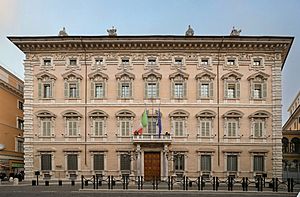
The prime minister of Italy is the head of government. They have executive power. But they need approval from the Council of Ministers for most policies. The president appoints the prime minister and cabinet. Parliament then confirms them with a vote. To stay prime minister, one must keep winning votes of confidence. The prime minister's role is similar to other parliamentary systems. However, they cannot dissolve parliament. The prime minister is also in charge of intelligence policies and cybersecurity.
Transportation in Italy
Italy's railway network is about 16,627 kilometers long. This makes it the 17th longest in the world. High-speed trains, like the ETR class, can travel at 300 km/h (186 mph).
Culture of Italy
Italy is one of the birthplaces of Western culture. It is also considered a cultural superpower. Italy's culture has been shaped by many regional customs and local centers of power. Italy has made a huge contribution to the cultural and historical heritage of Europe.
Architecture in Italy

Italy is known for its amazing buildings. Ancient Rome built arches, domes, and similar structures. The Renaissance architectural movement started in Italy in the late 14th century. Italy was also home to Palladianism. This style inspired movements like Neoclassical architecture. It influenced designs of country houses worldwide, especially in the UK and US.
The Greeks and Etruscans first started recognized designs. Then came classical Roman architecture. The Renaissance brought back classical Roman styles. This evolved into the Baroque era. The Christian idea of the basilica, a style common in the Middle Ages, was invented in Rome. Romanesque architecture, from about 800 to 1100 AD, was a very creative time in Italy. Masterpieces like the Leaning Tower of Pisa and the Basilica of Sant'Ambrogio were built. This style used Roman arches, stained glass, and curved columns. A key new idea in Italian Romanesque architecture was the vault.
Italian architecture changed a lot during the Renaissance. Filippo Brunelleschi designed the dome for the Cathedral of Florence. This was a huge engineering feat for its time. A famous Renaissance building is St. Peter's Basilica. It was designed by Donato Bramante in the early 16th century. Andrea Palladio influenced architects across Europe with his villas and palaces.
The Baroque period also produced great Italian architects. The Palazzina di caccia of Stupinigi is a unique example of late Baroque and Rococo architecture. In 1752, Luigi Vanvitelli began building the Royal Palace of Caserta. In the late 1700s and early 1800s, Italy was influenced by Neoclassical architecture. Villas, palaces, gardens, and art began to be based on ancient Roman and Greek ideas again.
During the Fascist period, a style called "Novecento movement" became popular. It looked back to imperial Rome. Marcello Piacentini created a simpler Neoclassical style for city changes.
Visual Art in Italy
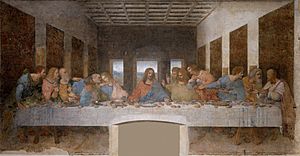
The history of Italian visual arts is very important to Western painting. Roman art was influenced by Greece. The only Roman paintings that still exist are wall paintings. These might be the first examples of trompe-l'œil (trick of the eye), fake perspective, and pure landscapes.
The Italian Renaissance is seen as the golden age of painting. It lasted from the 14th to the mid-17th centuries. It had a big influence outside Italy. Artists like Masaccio, Filippo Lippi, Tintoretto, Sandro Botticelli, Leonardo da Vinci, Michelangelo, Raphael, and Titian made painting much better. They used perspective to create depth. Michelangelo was also a sculptor. His famous works include David, Pietà, and Moses.
In the 15th and 16th centuries, the High Renaissance led to a new style called Mannerism. Instead of balanced art, Mannerists wanted instability and doubt. The calm faces of Piero della Francesca and Raphael were replaced by the troubled looks of Pontormo and the strong emotions of El Greco.
In the 17th century, important painters of Italian Baroque included Caravaggio, Artemisia Gentileschi, and Carlo Saraceni. In the 18th century, Italian Rococo was mainly inspired by French Rococo. Italian Neoclassical sculpture focused on ideal beauty.
In the 19th century, Romantic painters included Francesco Hayez. Impressionism came to Italy from France. Realism was also important. In the 20th century, with futurism, Italy again became a key country for new ideas in painting and sculpture. Futurism was followed by the metaphysical paintings of Giorgio de Chirico. He influenced the surrealists.
Literature in Italy
Formal Latin literature began in 240 BC. That's when the first play was performed in Rome. Latin literature was, and still is, very influential. Many writers, poets, and historians like Virgil, Horace, and Livy wrote in Latin. The Romans were known for their oral stories, poetry, and plays. In the early 13th century, Francis of Assisi was the first Italian poet. He wrote the religious song Canticle of the Sun.
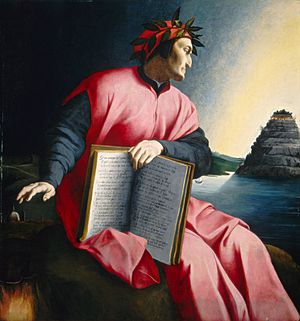
At the court of Emperor Frederick II in Sicily in the 13th century, poems were written in a refined local language. One of these poets, Giacomo da Lentini, invented the sonnet form. The most famous early sonnet writer was Petrarch.
Guido Guinizelli founded the Dolce Stil Novo. This was a school of poetry that added deep thought to love poems. This new way of understanding love influenced the Florentine poet Dante Alighieri. Dante's work, the Divine Comedy, is one of the best in literature. Petrarch and Giovanni Boccaccio studied ancient works. Petrarch became famous for his poems, Il Canzoniere. Boccaccio's The Decameron, a collection of short stories, was also very influential.
Renaissance writers include Niccolò Machiavelli. His book The Prince is about political science. It says that practical truth is more important than ideals. Giovanni Francesco Straparola and Giambattista Basile wrote some of the first known fairy tales in Europe. The Baroque period saw the clear scientific writing of Galileo. In the 17th century, the Arcadians tried to bring simplicity back to poetry.
Italian writers embraced Romanticism in the 19th century. This matched the ideas of the Risorgimento. This movement led to Italian unification. Poets like Vittorio Alfieri and Giacomo Leopardi announced this unification. Works by Alessandro Manzoni, a leading Italian Romantic, became a symbol of Italian unity. This was because of his patriotic message and his efforts to develop a unified Italian language.
In the late 19th century, a movement called verismo became important in Italian literature. It focused on realism. Emilio Salgari wrote adventure stories and was a pioneer of science fiction. In 1883, Carlo Collodi published The Adventures of Pinocchio. This became one of the most famous children's books by an Italian author. It is also one of the world's most translated non-religious books. A movement called futurism influenced literature in the early 20th century.
Modern Italian writers who won the Nobel Prize include Giosuè Carducci (1906), Grazia Deledda (1926), Luigi Pirandello (1936), Salvatore Quasimodo (1959), Eugenio Montale (1975), and Dario Fo (1997). Other important figures are Gabriele D'Annunzio, Italo Calvino, and Umberto Eco.
Philosophy in Italy
Italian philosophy has influenced Western philosophy. This started with the Greeks and Romans. It continued through the Renaissance, the Age of Enlightenment, and modern philosophy. Formal philosophy came to Italy with Pythagoras. He founded the Italian school of philosophy. Italian philosophers from the Greek period include Xenophanes and Parmenides. Roman philosophers include Cicero, Lucretius, and Seneca the Younger.
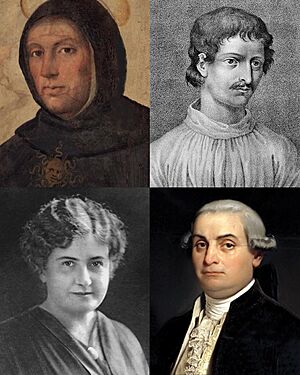
Italian medieval philosophy was mostly Christian. It included thinkers like Thomas Aquinas. He brought Aristotle's philosophy back to Christianity. Renaissance philosophers include Giordano Bruno, a major scientific figure. Niccolò Machiavelli is known as a founder of modern political science. His most famous work is The Prince. It separates political idealism from realism. University cities like Padua and Bologna remained centers of learning. Philosophers like Giambattista Vico taught there. Cesare Beccaria was an important Enlightenment figure. He is seen as a father of classical criminal theory.
Italy had a famous philosophical movement in the 1800s. It included idealism, sensism, and empiricism. In the late 19th and 20th centuries, other movements became popular. These included anarchism, communism, and fascism. Antonio Gramsci is an important philosopher in communist theory. He created the idea of cultural hegemony. Italian philosophers also helped develop liberal socialism. In the 1960s, left-wing activists developed theories called autonomism.
Italian feminists include Sibilla Aleramo. Earlier Italian writers also touched on proto-feminist ideas. Italian educator Maria Montessori created the Montessori philosophy of education. Giuseppe Peano helped found analytic philosophy and the philosophy of mathematics.
Theatre in Italy
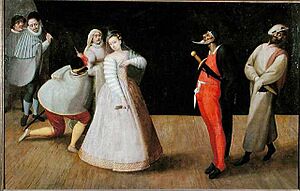
Italian theatre started in the Middle Ages. Its roots go back to ancient Greek colonies in southern Italy. It also comes from the theatre of the Italic peoples and theatre of ancient Rome. Theatre developed in two main ways. First, through plays based on Catholic church services. Second, through pagan shows like city festivals and jesters' performances. Renaissance theatre marked the start of modern theatre. Old plays were translated and performed in courts and public theatres. In the late 15th century, cities like Ferrara and Rome were important for bringing theatre back.
From the 16th to the 18th century, commedia dell'arte was a popular type of improvisational theatre. It is still performed today. Traveling groups of actors would set up outdoor stages. They offered entertainment like juggling, acrobatics, and funny plays. The plays were not written down. Instead, they used simple outlines called lazzi. Actors would improvise around these outlines. The characters in commedia usually represent fixed social types. Each character has a special costume. The first recorded commedia dell'arte shows were in Rome as early as 1551. Women played female roles, starting in the 1560s. This made them the first known professional actresses in Europe since ancient times.
Ballet also started in Italy during the Renaissance. It grew out of court shows and celebrations.
Music in Italy
Music is a big part of Italian culture, from folk to classical. Instruments like the piano and violin were invented in Italy. Many important music forms, such as the symphony, concerto, and sonata, came from Italian music in the 16th and 17th centuries.
Italy's most famous composers include Giovanni Pierluigi da Palestrina (Renaissance), Claudio Monteverdi (Renaissance), Domenico Scarlatti (Baroque), Antonio Vivaldi (Baroque), Niccolò Paganini (classical), Gioachino Rossini (classical), Giuseppe Verdi (Romantic), and Giacomo Puccini (Romantic). Classical music is very strong in Italy. This is seen in its famous opera houses, like La Scala. Famous performers include pianist Maurizio Pollini and tenor Luciano Pavarotti. Italy is known as the birthplace of opera. Italian opera is believed to have started in the 17th century.
Jazz became popular in Italy in the early 1920s. It stayed popular even though the Fascists had policies against foreign things. Italy was also part of the progressive rock and pop music scenes in the 1970s. Bands like PFM and Pooh were famous. During this time, Italian movies also had complex music scores by composers like Ennio Morricone. In the 1980s, Jovanotti became the first star from Italian hip hop. Italian metal bands include Lacuna Coil and Rhapsody of Fire.
Italy helped develop disco and electronic music. Italo disco was one of the first electronic dance music styles. It was known for its futuristic sound and use of synthesizers. Producers like Giorgio Moroder were very important in electronic dance music. Italian pop music is celebrated every year at the Sanremo Music Festival. This festival inspired the Eurovision Song Contest. Italian singers like Andrea Bocelli, Laura Pausini, and Eros Ramazzotti are famous worldwide.
Cinema in Italy
Italian cinema began shortly after the Lumière brothers showed their first movies. The first Italian director, Vittorio Calcina, filmed Pope Leo XIII in 1896. Cabiria, from 1914, is the most famous Italian silent film. The oldest European avant-garde cinema movement, Italian futurism, happened in the late 1910s.
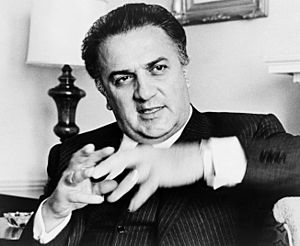
After a decline in the 1920s, the film industry grew again in the 1930s with sound. A popular Italian style, the Telefoni Bianchi, were comedies with fancy settings. Calligrafismo was a different style. It was artistic, complex, and often dealt with literature. Cinema was used by Mussolini, who founded Rome's famous Cinecittà studio, to make Fascist propaganda.
After World War II, Italian films became very famous around the world. This lasted until the 1980s. Italian film directors like Federico Fellini, Sergio Leone, and Roberto Rossellini are considered among the greatest of all time. From the mid-1940s to the early 1950s, Italian neorealism was popular. It showed the difficult conditions in Italy after the war.
As Italy became wealthier in the 1950s, a new form of neorealism appeared. The commedia all'italiana (comedy Italian style) and other film genres were popular in the 1960s and 70s. These included sword-and-sandal films and spaghetti Westerns. Actresses like Sophia Loren became international stars. More recently, Italian films like Life Is Beautiful and Cinema Paradiso have gained attention.
Cinecittà studio in Rome is the largest film and TV production facility in Europe. Many international movies have been filmed there. In the 1950s, Rome was called "Hollywood on the Tiber" because so many international films were made there. Over 3,000 productions have been made at Cinecittà. Of these, 90 were nominated for an Academy Award, and 47 won. Italy has won the most Best Foreign Language Film awards, with 14 wins. Italian films have also won many awards at major film festivals.
Sport in Italy
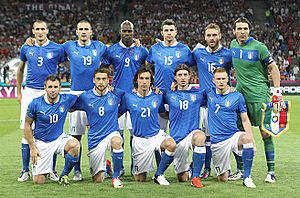
The most popular sport in Italy is football. Italy's national team is one of the most successful. They have won the World Cup four times (1934, 1938, 1982, and 2006). They have also won the UEFA Euro twice (1968 and 2020). Italian football clubs have won 48 major European trophies. This makes Italy the second most successful country in Europe for club football. Italy's top league is Serie A. Millions of fans around the world follow it.
Other popular team sports include basketball, volleyball, and rugby. Italy's national volleyball teams are often among the best in the world. The men's team won three World Championships in a row (1990, 1994, and 1998). The men's basketball team won gold at the EuroBasket in 1983 and 1999. They also won silver at the 2004 Olympics. The Lega Basket Serie A is one of Europe's most competitive basketball leagues. The Italy national rugby union team plays in the Six Nations Championship and the Rugby World Cup.
In individual sports, bicycle racing is popular. Italians have won the UCI World Championships more than any other country except Belgium. The Giro d'Italia is a cycling race held every May. It is one of the three major Grand Tours. Alpine skiing is also a popular sport. Italy is a well-liked skiing destination. Italian skiers do well in the Winter Olympic Games and the Alpine Ski World Cup. Tennis is also very popular. The Rome Masters is one of the most important tennis tournaments. Italian players won the Davis Cup in 1976 and the Fed Cup several times.
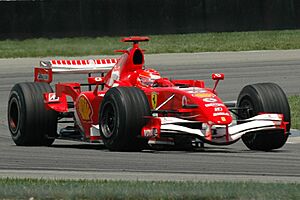
Motorsports are also very popular. Italy has won the most MotoGP World Championships by far. The Italian team Scuderia Ferrari is the oldest team in Grand Prix racing. It has competed since 1948. It is the most successful Formula One team with many wins. The Italian Grand Prix of Formula One has been held since 1921. Other successful Italian car makers in motorsports include Alfa Romeo, Lancia, and Maserati.
Italy has been very successful in the Olympics. It has taken part in almost all Olympic Games since the first one in 1896. Italians have won many medals at both the Summer and Winter Olympics. Italy has hosted the Winter Olympics twice (1956 and 2006). It will host another in 2026. It also hosted a Summer Games in 1960.
Fashion and Design in Italy
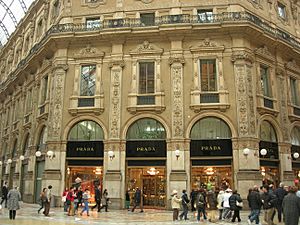
Italian fashion has a long history. In 2013, Rome was ranked sixth and Milan twelfth among the "Top Global Fashion Capitals." Major Italian fashion brands like Gucci, Armani, Prada, Versace, Valentino, and Dolce & Gabbana are among the best in the world. Jewelers like Bulgari and Damiani were also founded in Italy. The fashion magazine Vogue Italia is one of the most respected fashion magazines globally.
Italy is also famous for design. This includes interior, architectural, industrial, and urban designs. Milan and Turin are the leading cities for architectural and industrial design. Milan hosts Fiera Milano, Europe's largest design fair. Milan also hosts big design and architecture events. It has been home to famous designers like Bruno Munari and Lucio Fontana.
Public Holidays and Festivals
Public holidays in Italy include religious, national, and regional celebrations. Italy's National Day, the Festa della Repubblica (Republic Day), is on June 2. It celebrates the birth of the Italian Republic in 1946. The main celebration is in Rome. It includes placing a wreath at the Italian Unknown Soldier and a military parade.
Saint Lucy's Day, on December 13, is popular with children in some Italian regions. She brings gifts, similar to Santa Claus. The Epiphany is linked to the folklore figure of Befana. She is an old woman who rides a broomstick. On the night of January 5, she brings gifts to good children and charcoal to naughty ones. The Assumption of Mary is on August 15. This day is also Ferragosto, the summer vacation period. Italy's national patronal day is on October 4. It celebrates Saints Francis and Catherine. Each city or town also celebrates a public holiday for its local patron saint.
Festivals and festivities include the Palio di Siena horse race. There are also Holy Week rites and the Saracen Joust of Arezzo. In 2013, UNESCO added Italian festivals and pasos to its list of intangible cultural heritage. These include the Varia di Palmi and the Macchina di Santa Rosa in Viterbo. Other festivals include carnivals in Venice, Viareggio, and Ivrea. The Venice Film Festival is the oldest film festival in the world. It started in 1932 and gives out the Golden Lion award.
Related pages
- List of presidents of Italy
- Italy at the Olympics
- Italy national football team
- Italian cuisine
- Italophilia
- Italian Mare Nostrum
- List of rivers of Italy
Images for kids
-
Expansion of the territory called "Italy" from ancient Greece until Diocletian
-
The Iron Crown of Lombardy, for centuries a symbol of the Kings of Italy
-
Marco Polo, explorer of the 13th century, recorded his 24 years-long travels in the Book of the Marvels of the World, introducing Europeans to Central Asia and China.
-
Christopher Columbus leads an expedition to the New World, 1492. His voyages are celebrated as the discovery of the Americas from a European perspective, and they opened a new era in the history of humankind and sustained contact between the two worlds.
-
Flag of the Cispadane Republic, which was the first Italian tricolour adopted by a sovereign Italian state (1797)
-
Holographic copy of 1847 of Il Canto degli Italiani, the Italian national anthem since 1946
-
Italian partisans in Milan during the Italian Civil War, April 1945
-
Alcide De Gasperi, first republican Prime Minister of Italy and one of the Founding Fathers of the European Union
-
The signing ceremony of the Treaty of Rome on 25 March 1957, creating the European Economic Community, forerunner of the present-day European Union
-
Dolphins in the Tyrrhenian Sea off the Aeolian Islands
-
The Italian wolf, the national animal of Italy
-
Milan is the economic capital of Italy, and is a global financial centre and a fashion capital of the world.
-
The Autostrada dei Laghi ("Lakes Motorway"), the first motorway built in the world
-
Trieste, the main port of the northern Adriatic and starting point of the Transalpine Pipeline
-
ENI is considered one of the world's oil and gas "Supermajors".
-
Solar panels in Piombino. Italy is one of the world's largest producers of renewable energy.
-
Galileo Galilei, the father of modern science, physics and astronomy
-
Enrico Fermi, creator of the world's first first nuclear reactor
-
Vatican City, the Holy See's sovereign territory
-
Bologna University, established in AD 1088, is the world's oldest academic institution.
-
The Last Supper (1494–1499), Leonardo da Vinci, Church of Santa Maria delle Grazie, Milan
-
Michelangelo's David (1501–1504), Galleria dell'Accademia, Florence
-
Dante shown holding a copy of the Divine Comedy, next to the entrance to Hell, the mount of Purgatory and the city of Florence, with the spheres of Heaven above, in Michelino's fresco, 1465
-
Niccolò Machiavelli, founder of modern political science and ethics
-
Pinocchio is one of the world's most translated books and a canonical piece of children's literature.
-
Clockwise from top left: Thomas Aquinas, proponent of natural theology and the Father of Thomism; Giordano Bruno, one of the major scientific figures of the Western world; Cesare Beccaria, considered the Father of criminal justice and modern criminal law; and Maria Montessori, credited with the creation of the Montessori education
-
La Scala opera house
-
Statues of Pantalone and Harlequin, two stock characters from the Commedia dell'arte, in the Museo Teatrale alla Scala
-
Dario Fo, one of the most widely performed playwrights in modern theatre, received international acclaim for his highly improvisational style.
-
Giacomo Puccini, Italian composer whose operas, including La bohème, Tosca, Madama Butterfly and Turandot, are among the most frequently worldwide performed in the standard repertoire
-
Luciano Pavarotti, considered one of the finest tenors of the 20th century and the "King of the High Cs"
-
Giorgio Moroder, pioneer of Italo disco and electronic dance music, is known as the "Father of disco".
-
The Azzurri in 2012. Football is the most popular sport in Italy.
-
Starting in 1909, the Giro d'Italia is the Grands Tours' second oldest.
-
A Ferrari SF21 by Scuderia Ferrari, the most successful Formula One team
-
Prada shop at Galleria Vittorio Emanuele II in Milan
-
The Venice Film Festival is the oldest film festival in the world.
See also
 In Spanish: Italia para niños
In Spanish: Italia para niños




